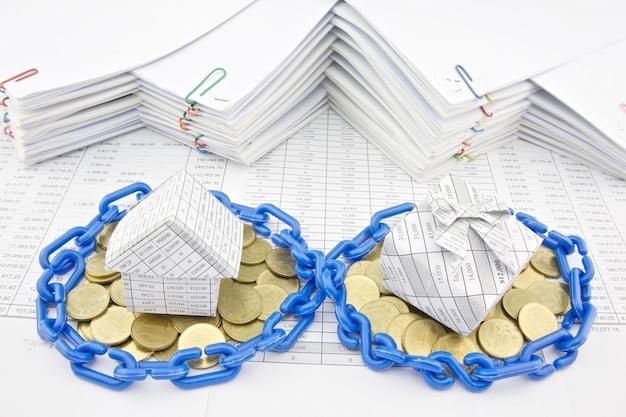How the 2025 Federal Rate Hike Affects Your Debt Consolidation

The Federal Reserve’s interest rate hike in January 2025 significantly influences debt consolidation options by altering borrowing costs, potentially affecting eligibility and the overall attractiveness of consolidating debt.
Navigating debt can feel overwhelming, especially when economic shifts like a Federal Reserve interest rate hike come into play. The January 2025 increase has ripple effects, and understanding how the new Federal Interest Rate Hike (January 2025) impacts your debt consolidation options is crucial for making informed financial decisions.
Understanding the Federal Interest Rate Hike
The Federal Reserve, often called the Fed, manages the nation’s monetary policy. This includes setting the federal funds rate, which influences interest rates across the economy.
An interest rate hike is a tool used by the Fed to combat inflation. By increasing the cost of borrowing, the Fed aims to reduce spending and slow down economic growth, ultimately bringing inflation under control.
Why Did the Fed Raise Interest Rates in January 2025?
The decision to raise interest rates in January 2025 likely stemmed from concerns about persistent inflation or a stronger-than-expected economic recovery. Several factors could have contributed to this decision:
- Inflationary Pressures: If inflation remained above the Fed’s target rate, an interest rate hike would be a primary tool to curb rising prices.
- Economic Growth: A rapidly growing economy can lead to inflation. Raising interest rates helps to moderate this growth.
- Labor Market: A tight labor market with rising wages can also contribute to inflation. Higher interest rates can cool down the labor market.
The Fed’s actions are data-dependent, meaning they closely monitor economic indicators before making any decisions about interest rates. Understanding the reasoning behind the hike is key to predicting its future impact.
In summary, the Federal Reserve’s decision to raise interest rates is a crucial economic lever used to manage inflation and economic growth. Understanding the reasons behind this decision is essential for anticipating its broad effects on the financial landscape.
What is Debt Consolidation and How Does It Work?
Debt consolidation is a financial strategy that combines multiple debts into a single, new loan or payment plan. This can simplify repayment and potentially lower interest rates.
The basic idea is to take out a new loan – often a personal loan, balance transfer credit card, or a home equity loan – to pay off existing debts, such as credit card balances, medical bills, or other outstanding loans. Instead of managing multiple payments with varying interest rates and due dates, you’ll have just one payment to make.

Common Debt Consolidation Options
There are several popular methods for consolidating debt:
- Personal Loans: Unsecured loans from banks or credit unions with fixed interest rates and repayment terms.
- Balance Transfer Credit Cards: Transfer high-interest credit card balances to a new card with a lower introductory rate.
- Home Equity Loans or HELOCs: Secured loans using your home’s equity as collateral.
Choosing the right option depends on your credit score, debt amount, and financial goals. Weigh the pros and cons of each to find the best fit.
Debt consolidation provides a structured approach to managing and reducing debt by streamlining multiple obligations into a single, manageable loan or payment plan. By understanding the mechanisms and available options, individuals can make informed decisions to improve their financial health.
Direct Impact of the Rate Hike on Debt Consolidation Loans
The federal interest rate hike directly affects the interest rates you’ll encounter when seeking a debt consolidation loan. This means higher borrowing costs.
Lenders typically base their interest rates on benchmarks like the prime rate, which closely follows the federal funds rate. When the Fed raises rates, these benchmarks increase, leading to higher interest rates on various types of loans.
Increased Interest Rates
- Personal Loans: Expect to see higher interest rates on new personal loans used for debt consolidation.
- Balance Transfer Credit Cards: Introductory offers might become less attractive, with higher rates after the promotional period.
- Home Equity Loans/HELOCs: Interest rates on these secured loans will also rise, increasing the overall cost of borrowing.
The higher the interest rate, the more you’ll pay over the life of the loan. Carefully consider the total cost, not just the monthly payment.
In conclusion, increased borrowing costs due to the federal interest rate hike make debt consolidation loans more expensive. Therefore, it is essential to evaluate the total cost of the loan.
Eligibility for Debt Consolidation in a High-Rate Environment
Higher interest rates can tighten lending standards. This means it might become more difficult to qualify for a debt consolidation loan.
Lenders become more cautious when interest rates rise, as the risk of default increases. They may raise their credit score requirements, income verification thresholds, and debt-to-income ratio limits.

Tighter Lending Standards
Here’s how the rate hike can impact eligibility:
- Credit Score: A higher credit score may be required to secure a favorable interest rate or even qualify for the loan.
- Income Verification: Lenders may scrutinize income more closely to ensure borrowers can comfortably afford the payments.
- Debt-to-Income Ratio (DTI): A lower DTI may be necessary, as lenders want to reduce their risk exposure.
If you’re planning to consolidate debt, it’s crucial to improve your creditworthiness and demonstrate financial stability.
In summary, tighter lending standards in a high-rate environment can make it more difficult to qualify for a debt consolidation loan. By addressing factors such as your credit score and debt-to-income ratio, you can enhance your eligibility.
Strategies to Navigate Debt Consolidation After the Rate Hike
Even with higher interest rates, debt consolidation can still be a worthwhile strategy. It’s all about adapting your approach.
Exploring strategies tailored to the current environment can help you find more favorable terms and maximize the benefits of debt consolidation.
Effective Strategies for Debt Consolidation
Here are some actionable strategies:
- Shop Around: Compare offers from multiple lenders to find the lowest possible interest rate. Credit unions and online lenders may offer competitive rates.
- Improve Your Credit Score: Work on improving your credit score before applying. Pay bills on time, reduce credit card balances, and correct any errors on your credit report.
- Consider a Secured Loan: If you own a home, a home equity loan or HELOC might offer a lower interest rate compared to unsecured personal loans.
Remember, patience and diligence are key to finding the best debt consolidation solution in a rising interest rate environment.
In a high interest rate environment, strategic planning becomes essential. These strategies can help you secure a better debt consolidation plan.
Alternatives to Debt Consolidation in 2025
If debt consolidation becomes too expensive or difficult to obtain, consider alternative debt management strategies.
Exploring different options can provide relief and help you regain control of your finances without relying solely on debt consolidation.
Exploring Alternatives
Here are some viable alternatives:
- Debt Management Plans (DMPs): Work with a credit counseling agency to create a structured repayment plan with lower interest rates and fees.
- Debt Snowball or Avalanche Methods: Focus on paying off your debts one at a time, either by size (snowball) or interest rate (avalanche).
- Negotiate with Creditors: Contact your creditors directly to negotiate lower interest rates, payment plans, or even partial debt forgiveness.
Assess your financial situation carefully and choose the alternative that best aligns with your goals and resources.
In short, if conventional debt consolidation is not feasible, alternative debt management strategies such as DMPs, snowball/avalanche methods, and direct negotiation with creditors can provide effective pathways to financial stability.
| Key Point | Brief Description |
|---|---|
| 📈 Rate Hike Impact | Increased borrowing costs for debt consolidation options. |
| 🔑 Eligibility | Tighter lending standards require a higher credit score. |
| 💡 Strategies | Shop around and improve your credit score. |
| 🔄 Alternatives | Explore debt management plans and negotiation with creditors. |
Frequently Asked Questions
▼
For fixed-rate debts such as mortgages and some personal loans, the rate hike won’t directly change your payments. However, variable-rate debts like credit cards and HELOCs will likely see increased interest charges, making them more expensive over time.
▼
It can be, but you need to be more diligent. Compare offers from multiple lenders to find the lowest possible interest rate. If the new rate is lower than the average of your current debts, consolidation could still save you money.
▼
While it varies by lender, aim for a credit score of 700 or higher to secure the most favorable terms. However, some lenders may work with scores in the mid-600s, albeit at a higher interest rate. Check several lenders to find best option.
▼
Yes, focus on paying off high-interest debts like credit cards first. This approach, known as the debt avalanche method, minimizes the total interest you’ll pay over time and can free up cash for other financial goals.
▼
Non profit agencies such as the National Foundation for Credit Counseling can help create debt repayment plans. They can also analyze your debts and income and give advice.
Conclusion
The January 2025 federal interest rate hike undoubtedly complicates debt consolidation decisions. By understanding its impact, exploring alternative strategies, and adapting your approach, you can still achieve your financial goals and regain control of your debt.





